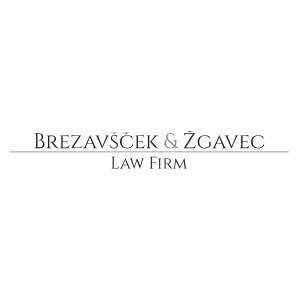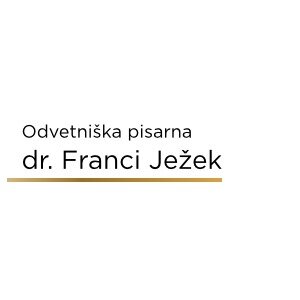Best Conveyancing Lawyers in Slovenia
Share your needs with us, get contacted by law firms.
Free. Takes 2 min.
Free Guide to Hiring a Real Estate Lawyer
Or refine your search by selecting a city:
List of the best lawyers in Slovenia
About Conveyancing Law in Slovenia
Conveyancing in Slovenia refers to the legal process of transferring the ownership of real estate property from one person or entity to another. This process involves a series of legal checks, the preparation and signing of contracts, due diligence, registration in the Land Register, and coordination with various government authorities. Slovenian law strives to protect both buyer and seller interests. The process is highly regulated, ensuring legal certainty in property transactions, and usually requires the involvement of lawyers or notaries.
Why You May Need a Lawyer
There are several reasons why someone may require legal assistance in conveyancing transactions in Slovenia. Common situations include:
- Purchasing or selling a home, apartment, or commercial property
- Transferring property ownership due to inheritance or gifts
- Dividing property as part of a divorce or family settlement
- Clarifying unclear ownership rights or resolving disputes about property boundaries or access
- Releasing or registering mortgages and liens
- Dealing with developers or pre-construction property purchases
- Ensuring all taxes and fees are correctly calculated and paid
- Registering ownership accurately in the Slovenian Land Register
- Managing cross-border or foreign buyer or seller issues
Engaging a legal professional ensures that all documents are legally binding and that the transaction proceeds smoothly, minimizing future risks.
Local Laws Overview
Slovenian conveyancing law is governed by several statutes and regulations, the most important being the Law of Property Code, the Land Register Act, and various tax and civil procedure codes. Key aspects include:
- All property transfers must be formalized by written contract, typically drafted or certified by a lawyer or notary public.
- The transfer of ownership is only legally effective once it is registered with the official Land Register maintained by the court.
- Due diligence is required to verify ownership, debts, encumbrances, use permits, and compliance with zoning or heritage restrictions.
- Foreigners can buy real estate in Slovenia, although some restrictions may apply depending on reciprocal rights between countries and type of property.
- The payment of property transfer taxes, notary fees, and potentially real estate agent fees are compulsory steps.
- Special rules apply for agricultural land and protected properties.
Frequently Asked Questions
What is conveyancing in Slovenia?
Conveyancing is the legal process of transferring ownership of property in Slovenia, involving drafting, signing and registering contracts, conducting due diligence checks, and ensuring all legal and regulatory requirements are met.
Do I need a lawyer for conveyancing in Slovenia?
While it is not mandatory to use a lawyer, it is strongly recommended. Lawyers can help draft or review contracts, conduct checks, and prevent legal problems before and after purchase.
What documents are required for a property transfer?
You will need the property deed or land registry excerpt, written contract, identity documents from all parties, evidence of tax and fee payments, and in some cases, additional approvals or declarations.
How is property ownership registered in Slovenia?
Ownership transfer is registered at the Land Register (Zemljiška knjiga), which is maintained by local courts. The submitted documentation must meet legal standards for registration to be granted.
Are there special rules for foreign buyers in Slovenia?
Yes, while EU citizens generally have the same rights as Slovenian citizens, citizens of some countries may face restrictions. You should always verify your eligibility before proceeding.
How long does the conveyancing process take?
The whole process typically takes from a couple of weeks to several months, depending on the complexity of the transaction, due diligence findings, and court processing times.
What taxes and fees should I expect?
Buyers usually pay property transfer tax (2 percent of the sales price for existing property), notary fees, and possibly real estate agent commissions. New properties may be subject to value added tax (VAT) instead.
What are the risks of not using a lawyer for conveyancing?
Risks include unclear property title, undisclosed debts or mortgages, problems with boundaries or usage rights, void contracts, and inability to register ownership properly, which can result in significant financial losses.
Can I use a template contract to transfer property?
While template contracts exist, each transaction is unique and mistakes can be costly. Using a customized, legally reviewed contract ensures your interests are adequately protected.
If a dispute arises after the transaction, what are my options?
Disputes are usually resolved through negotiation, mediation, or litigation. Your lawyer can guide you through the process and represent you in court if necessary.
Additional Resources
For further information and assistance, the following resources can be helpful:
- Slovenian Land Register (Zemljiška knjiga) - for property records and ownership verification
- Notary Chamber of Slovenia - for finding a registered notary public
- Slovenian Bar Association - for locating qualified lawyers with conveyancing expertise
- Ministry of Justice - for an overview of legal procedures and formal requirements
- Surveying and Mapping Authority - for official property plans and cadastral records
- Local municipal offices - for property taxes, local fees, and planning approvals
Next Steps
If you need legal assistance with conveyancing in Slovenia, consider taking the following steps:
- Gather all available documentation regarding the property and parties involved
- Research reputable legal professionals specializing in property law or ask for recommendations
- Arrange an initial consultation to discuss your needs, clarify procedures, and get a cost estimate
- Ensure your chosen lawyer or notary is registered and licensed in Slovenia
- Follow your lawyer’s guidance throughout the process, reading all documents carefully before signing
- Keep copies of all agreements, receipts, and official correspondence
- If you are a foreigner, confirm your eligibility for property purchase under current Slovenian law
Legal support can simplify the conveyancing process and help you avoid costly and time-consuming mistakes. Starting with proper guidance assures a smooth and secure property transfer in Slovenia.
Lawzana helps you find the best lawyers and law firms in Slovenia through a curated and pre-screened list of qualified legal professionals. Our platform offers rankings and detailed profiles of attorneys and law firms, allowing you to compare based on practice areas, including Conveyancing, experience, and client feedback.
Each profile includes a description of the firm's areas of practice, client reviews, team members and partners, year of establishment, spoken languages, office locations, contact information, social media presence, and any published articles or resources. Most firms on our platform speak English and are experienced in both local and international legal matters.
Get a quote from top-rated law firms in Slovenia — quickly, securely, and without unnecessary hassle.
Disclaimer:
The information provided on this page is for general informational purposes only and does not constitute legal advice. While we strive to ensure the accuracy and relevance of the content, legal information may change over time, and interpretations of the law can vary. You should always consult with a qualified legal professional for advice specific to your situation.
We disclaim all liability for actions taken or not taken based on the content of this page. If you believe any information is incorrect or outdated, please contact us, and we will review and update it where appropriate.
Browse conveyancing law firms by city in Slovenia
Refine your search by selecting a city.
















